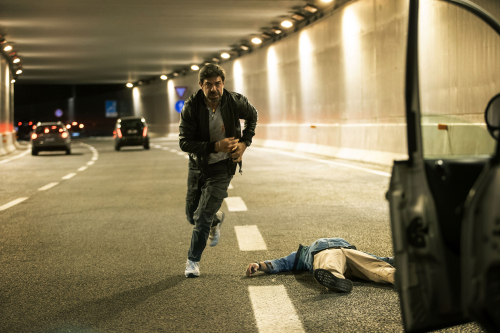
Loris T. Zambelli
MOVIE REVIEW
The Last Night of Amore (2023)
Honestly, it should be in the police manual: If it's the last day before your retirement, absolutely do not under any circumstances agree to one last job. And if on the last day before your retirement you agree to one last job, absolutely do not under any circumstances take your single-parent partner along with you. And if on the last day before your retirement you agree to one last job and take your single-parent partner along with you, absolutely do not under any circumstances agree to any, and that means any, change of plan. Of course if the characters had learned any of this, there would be no movie.
“The Last Night of Amore” is an ambitious and knowing thriller about the complicated criminal underbelly in Milan, established with a jaw-dropping extended aerial shot by Guido Michelotti that runs under the opening credits. It encompasses the entire city at night, showing the old town, the modern city, the docks and the train station, before slowing down to focus on an apartment where a surprise retirement party is being thrown for Detective Amore (Pierfrancesco Favino) by his much younger second wife, Viviana (Linda Caridi).
Viviana and Amore’s happy marriage is not surprising because she’s the same age as Amore’s daughter. It’s because of their very different backgrounds: Viviana is from a mafia family, comfortable with tweaking the rules to her own ends, while Amore is a stand-up guy, honest to a fault, who’s never fired his gun. He married Viviana knowing her family connections would cost him any chance of promotion, but he loved her enough to do it anyway. Viviana's cousin Cosimo (Antonio Gerardi, if the grandfather from “Up” was a flashy dresser) is a high-end jeweller who uses Amore as his driver-bodyguard while he personally sells watches wherever the customers feel like meeting. It’s a shady arrangement, but it keeps the peace within the family while supplementing Amore’s laughable police salary. Honest cops here apparently are the ones who don’t commit crimes in the course of their secret side jobs or for the backhanders they more or less openly accept.
One night, the fearsome gangster financing the expansion of Cosimo’s business, Bao Zhang (Mao Wen), has a heart attack in Cosimo's hotel room. Cosimo panics and calls Amore, who calmly shoos the hookers performing chest compressions away and takes the credit for saving Bao's life. As a result, Amore is offered the opportunity to provide security for Bao’s quote-unquote business dealings. Viviana is thrilled at this excellent new income stream and unfazed at the obvious illegality all around her. Amore is less delighted, but is willing to – as long as he personally is not doing anything illegal, he’s clear on that – once he’s officially retired. Of course, shaking the devil’s hand means letting him call the shots, and an airport pickup needs to happen almost immediately. Amore’s nervous enough to bring in his partner, Dino (Francesco Di Leva), a single father who agrees the extra money for an hour-long errand is worth the risk to their careers. When the hour is over, there’s five corpses, a missing bag of diamonds and the pressing question of whether Amore will be able to outsmart the Italian police, Viviana’s family and the angry Chinese gangsters to survive till morning.
Writer-director Andrea Di Stefano elevates his film above the average crime thriller and earned its place in the Berlinale by making the movie’s true focus Amore and Viviana’s marriage. Despite the repeated scenes of them screaming and swearing at each other, they truly love each other and trust each other implicitly. Viviana’s ride-or-die attitude to her man, and Amore’s ability to love a woman who’s been party to dirty dealings since childhood, provide an unusual angle on honesty, trust and personal integrity, both inside and outside a marriage. The hothouse police environment, where standard police work is supplemented by enough casual suspicion to power a spaceship, makes the political point that bravery is not its own reward without overdoing it. And the pervasive contempt for Amore’s personal code of ethics raises the question of what the purpose of policing is for, if everyone is already so corrupt.
Mr. Favino, a big star in Italian cinema, is very good here as the decent guy who, as things escalate, comes to the shocking realization that he’s not in over his head, while Ms. Caridi does unusually strong work as a chatty housewife comfortable doing bad things for the greater good. The small scene where Viviana gets a stranger to agree to a favor on the spot is a miniature masterclass in personal manipulation. But what remains from the movie is its sense of scope, how Mr. Michelotti’s images, Alessandro Rolla’s sound and Giogiò Franchini’s editing combine to create a feeling of place, whether that’s the underpass where the shootout takes place or a cosy armchair in Amore’s apartment. The unusually vivid sensations make “The Last Night of Amore” feel like a true story, one where the ending doesn’t mean it’s over. It’s an excellent film.
Comments